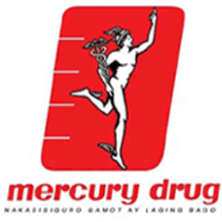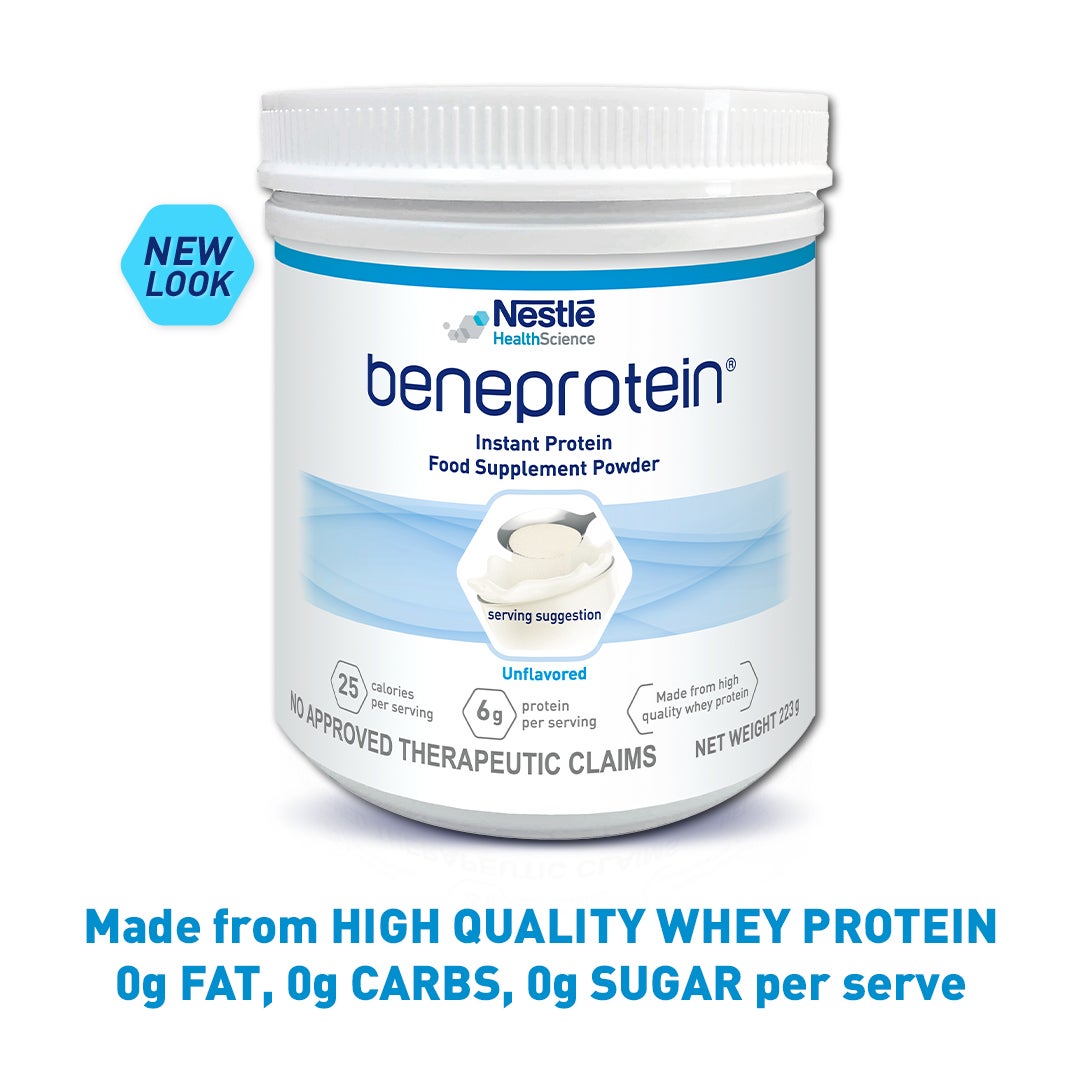
BENEPROTEIN®
Product Features
- 6g protein per scoop
- 0g fat, 0g sugar, 0g carbs per serve
- Made from high quality whey protein
- Easy to dissolve
- Unflavored
BENEPROTEIN® is suitable for:
- Patients with increased protein needs
Ingredients
Whey protein isolate (milk), Soy lecithin. Contains food allergens: milk and soy
Nutritional Panel
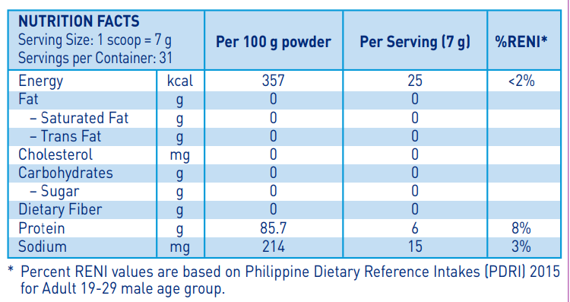
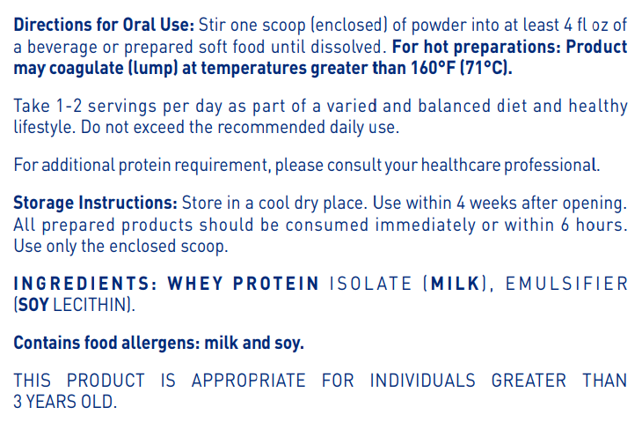
AVAILABILITY
- Mercury Drugstore
- South Star Drug
- Rose Pharmacy
- Metro Gaisano Pharmacy
- Watsons Pharmacy
- St. Joseph Drugstore
- Three Sixty Pharmacy
- NCCC-HB1 Pharmacy
- Amesco Drug
- Negros Grace Pharmacy
- Lazada (Nestlé official store & Lazmart)
- Shopee (Nestlé official store & Shopee Mart)
- Watsons Online Store
- Rose Pharmacy – Online Drugstore
Available ONLINE:

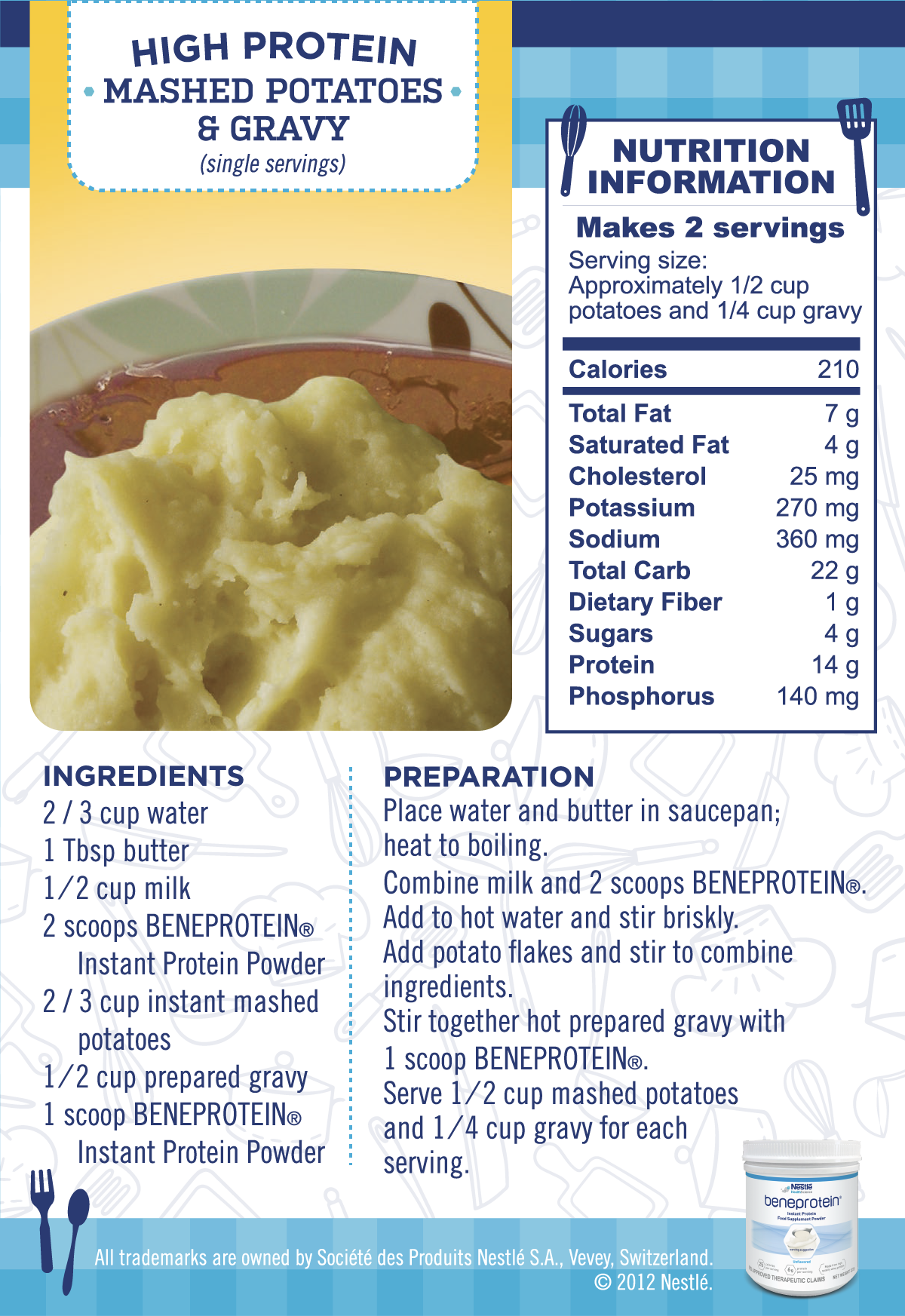
By Sonia Jhas, fitness expert
We’ve heard it time and time again: protein is crucial if you’re looking to shed fat and build muscle.i But what does protein really do?
And what kind of protein should you be eating? Are whole foods best? Or should you be eating protein supplements? It’s hard to know what’s best for us with all the information out there, particularly
since protein supplements have now become all the rage! Health stores, grocery stores, and heck, even convenience stores now offer a variety of bars, shakes, and powders to help you “get what
you need.” The question is “what do you actually need”?
Let’s start with the basics. Protein is indeed the single most important nutrient for both weight lossii and muscle gain.iii
The recommended dietary allowance (RDA) for adults is approximately 0.8 grams of protein per kilograms of bodyweightiv while
the Philippine Dietary Reference Intakes (PDRI 2015) recommends 62-71g/day of protein for adults. For those involved with intense exercise, it is generally advised that you eat 1.3 to 1.8 grams
of protein per kilogram of bodyweight.v
Protein is crucial if you’re looking to achieve tangible, sustainable weight loss results. It’s also now become clear that protein supplements, which were once thought to be a short-term
fad, are now being recognized as a long-term, sustainable trend – because let’s face it – we may not always have enough time or energy to eat or prepare whole foods that are high in protein.
Some people may have a hard time getting enough protein into their diet without a little help. Protein supplements generally contain 15-30 grams of protein per serving and are fortified
with vitamins and minerals. They come in a variety of forms – such as nutritional drinks and meal replacements, bars, powders, and chips – and they can often taste pretty amazing with flavours
such as strawberry, peanut butter chocolate, brownie, and even lemon coconut!
While whole foods are generally best, I personally recommend protein supplements for post-workout nutrition. After working out, I prefer a whey protein supplement because of its high biological
value (BV). The higher the biological value, the more amino acids and nitrogen your body retains from the food you eat. This means there’s more potential for muscle growth and strength. I also
recommend protein supplements as a “grab and go” option for anytime life seems to get in the way. Because protein supplements don’t require refrigeration, they’re portable, easy-to-stash in your
purse or bag, and therefore the perfect solution anytime you catch yourself in a bind.
Additional advantages of protein supplements:
- They are generally a more complete and balanced protein source
- They are often fortified with vitamins and minerals, making them a multi-dimensional protein food
- Many protein foods can serve as a low-calorie means to satisfy your sweet tooth
|
Protein |
Pros |
Cons |
|
Whey protein[vi] |
Promotes lean muscle growth and fat loss. Processed quickly by the body, which makes it great for post-workout recovery. |
Many people are sensitive to the lactose found in milk – this can cause bloating, gas, and discomfort. |
|
Casein protein |
Similar to whey protein, but it digests much more slowly, which makes it a great choice before bed. |
Digests slowly so it’s not great for post-workout recovery. It also tends to include additives to make it taste better. |
|
Rice protein |
Good source of complex carbohydrates, vitamin B1 and B6, and fibre. |
Deficient in some amino acids, so it shouldn’t be the primary source of protein. |
|
Soy protein |
Helps support immune function.[vii] |
Often a GMO product and can have a distinct after taste. |
|
Hemp protein |
Considered a “superfood” because it contains all essential amino acids.[viii] |
Tends to be expensive compared with alternatives. |
|
Egg protein |
Rich in vitamins and minerals. |
Tends to be expensive compared with alternatives. |
When it comes to protein supplements, there really is something for everyone. Just keep in mind that when it comes to buying protein, as in life, "you get what you pay for." Low-cost proteins often
use inexpensive protein blends that may not be very digestible by the body. My recommendation? Test out various sources and quantities of protein to see what works best for you and your body!
And yes, while I’m all about convenience, I don’t suggest you replace all whole foods with protein supplements entirely. They’re called “supplements” because they’re meant to supplement an already-healthy
diet of nutrition whole foods.
This article has been sponsored by Nestle Health Science, but all comments and opinions are my own.
Sonia Jhas
Sonia Jhas is a Toronto-based personal trainer, nutrition specialist, and the founder of SoniaJhas.com - a health and wellness consulting company in Toronto. In addition to inspiring her clients to achieve their best possible lives, Sonia has offered her expertise in several publications and broadcast television including Sirius XM, Huffington Post and Breakfast Television. As the winner of 2015’s Notable Award for Best in Sports and Fitness, and Pink Attitude Evolution’s Game Changer Award in Health and Wellness in 2016, Sonia has become a leading voice in health and wellness
[i]Thomas M Longland, Sara Y Oikawa, Cameron J Mitchell, Michaela C Devries, and Stuart M Phillips. Higher compared with lower dietary protein during an energy deficit combined with intense exercise promotes greater lean mass gain and fat mass loss: a randomized trial. American Journal of Clinical Nutrition, January 2016
[ii]Authority Nutrition. An Evidence-based Approach. “How Protein Can Help You Lose Weight Naturally.” Retrieved from: https://authoritynutrition.com/how-protein-can-help-you-lose-weight/ (Accessed June 2, 2017)
[iii]Paddon-Jones, D. et al. “Protein, weight management, and satiety.” The American Journal of Clinical Nutrtion. 2008. http://ajcn.nutrition.org/content/87/5/1558S.long
[iv]Eat Right Ontario. “Introduction To Protein And High Protein Foods.” Retrieved from: https://www.eatrightontario.ca/en/Articles/Protein/Introduction-To-Protein-And-High-Protein-Foods.aspx (Accessed June 2, 2017)
[v]Phillips, SM et al. “Dietary protein for athletes: from requirements to optimum adaptation.” J Sports Sci. 2011; 29 Suppl 1:S29-38 https://www.ncbi.nlm.nih.gov/pubmed/22150425
[vi] Eat Right Ontario. “Sports nutrition: Facts on sports supplements.” Retrieved from: http://www.eatrightontario.ca/en/Articles/Physical-Activity/Sports-nutrition-Facts-on-sports-supplements.aspx (Accessed June 2, 2017)
[vii] Yimit D. et al. “Effects of soybean peptide on immune function, brain function, and neutrochemistry in healthy volunteers.” Nutrition. 2012 Feb;28(2):154-9 https://www.ncbi.nlm.nih.gov/pubmed/21872436
[viii] Authority Nutrition. An Evidence-based Approach. “6 Evidence-Based Health Benefits of Hemp Seeds.” Retrieved from: https://authoritynutrition.com/6-health-benefits-of-hemp-seeds/ (Accessed June 2, 2017)
Depending on your daily routine, making sure you get enough protein can help you stay energized and conquer whatever your day throws at you – at work, at the gym and at home.
Choosing foods rich in protein is important for building tissues like skin, hair, nails and muscle. Balancing your meals and snacks with protein can help you feel full and satisfied throughout
the day, which has been shown to support weight management.i
To assist with keeping your energy levels steady, aim for 3 balanced meals per day. Some people also find that healthy snacks between meals help keep them going, especially when the time
between meals is longer. Try adding small snacks that include protein between meals if you feel like you need a little more energy.
Be sure to include a high quality source of protein like meat, chicken, fish, eggs, dairy products, beans, legumes, tofu, nuts or seeds at each meal and snack. Enjoying protein-rich foods
from a range of different foods will help you get a variety of important vitamins and minerals along with your protein.
Most healthy adults need an average of 0.8 grams of protein per kilogram body weight per day. If you exercise often and at a high intensity, your protein needs will be even higher. If
you do strength or endurance training at least 3 times a week, your protein needs could rise to 1.5 to 2 times the average level.ii Adults who are 55 years and over should aim for
about 1.2 grams of protein for every kilogram of body weight per day to help maintain their muscle mass and overall health. A suggested guide would be to try to eat about 20 to 30 grams of protein
in each meal and about 15 to 25 g of protein right after you exercise. This protein will help with muscle repair and growth and promote a faster recovery.iii
Higher levels of protein intake can be tough for some people to achieve, so try to include a high quality source of protein at each meal and snack to get you closer to your daily goal.
With a little planning, you will soon be on your way to reaching your daily protein goals. You can also reach for a nutritional drink on the go, after a workout, or if you’re in a pinch for a
source of protein, nutrient-dense, satisfying snack.
This article has been sponsored by Nestle Health Science, but all comments and opinions are my own.
i Leidy at al. The role of protein in weight loss and maintenance. Am J Clin Nutr 2015;101(Suppl):1320S–9S.
ii American College of Sports Medicine. Protein Intake for Optimal Muscle Maintenance. Available online at: http://www.acsm.org/docs/default-source/brochures/protein-intake-for-optimal-muscle-maintenance.pdf
iii Bauer et al. Evidence-Based Recommendations for Optimal Dietary Protein Intake in Older People: A Position Paper From the PROT-AGE Study Group. Journal of the American Medical
Directors Association. Volume 14, Issue 8, August 2013, Pages 542–559. Available online at: http://www.sciencedirect.com/science/article/pii/S1525861013003265
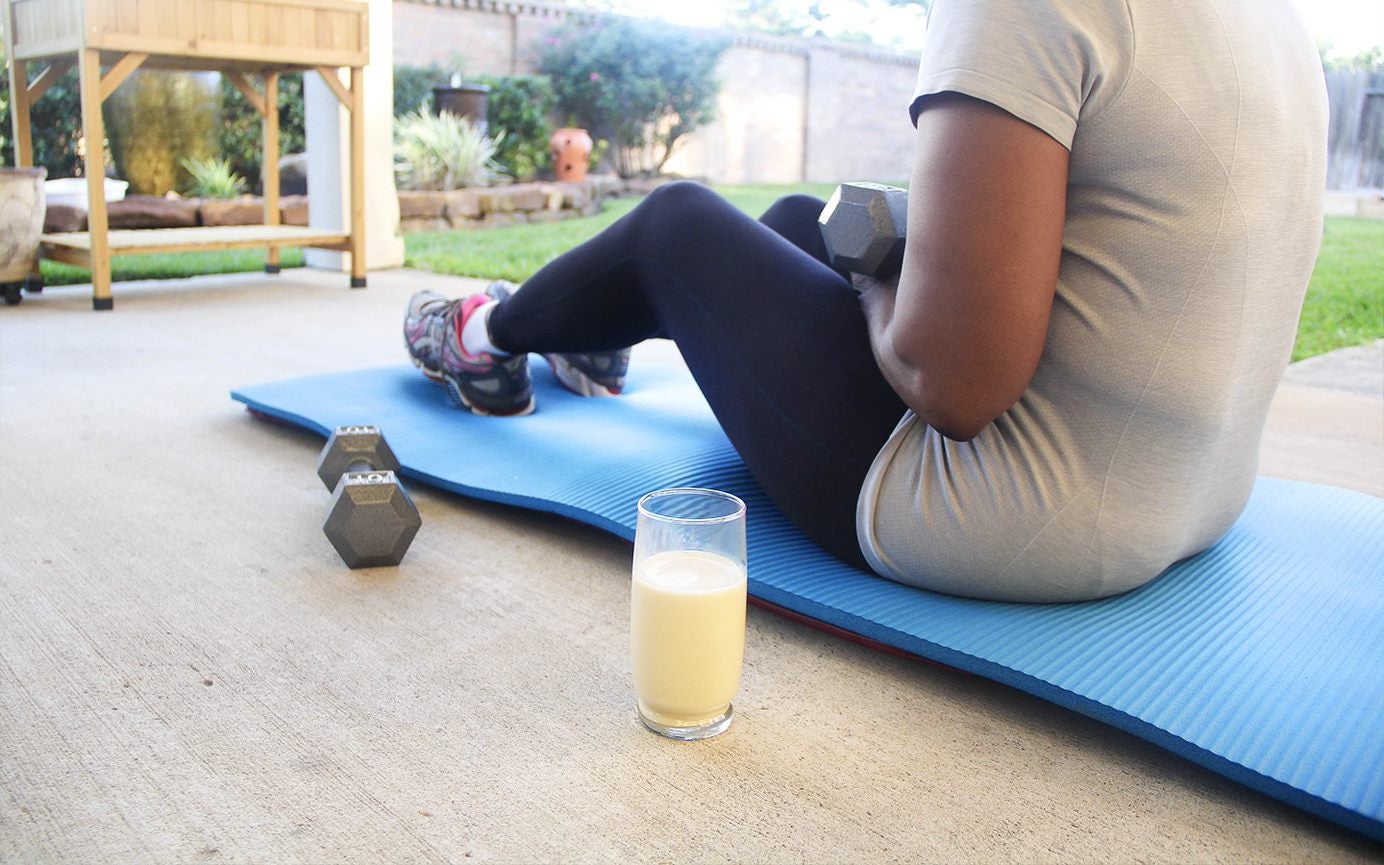
By Sonia Jhas, fitness expert
By now you’ve probably heard the facts: if you want to burn fat, build lean muscle, and boost your performance levels across the board, you need to eat protein. But did you know that protein
is a particularly important piece of the post-workout nutrition equation? When you work out, you create microscopic tears in your muscles, and this micro-trauma not only requires rest, but also
the right nutrition, to heal.i After a workout, your muscles are practically starving for nutrients, and a fast-digesting high protein / high simple carb meal is key.
Post-workout, protein helps to:
- Repair your musclesii
- Improve bone massiii
- Improve immune functioniv
So what kind of protein should you eat? Well, the goal is to consume protein that’s fast-digesting so that it can quickly shuttle into your muscle cells. My favourite whole food meal is an egg white omelette with some sliced fruit and a slice of toast.
Since a whole food meal typically takes more time to prepare and digest, I often recommend using a protein supplement to expedite the recovery process. Whey protein is my go-to because it’s rich in BCAAs (branched-chain amino acids), digests quickly, and is highly bioavailable. Consuming about 20-30 grams of fast-digesting protein after a workout will prevent your body from using its own muscle tissue for energy and will help encourage muscle synthesis. What does this mean? Better results and faster recovery for your next workout session. Alternatively, you can make a smoothie using a store-bought nutrition supplement, such as Beneprotein®.
This article has been sponsored by Nestle Health Science, but all comments and opinions are my own.
Sonia Jhas
Sonia Jhas is a Toronto-based personal trainer, nutrition specialist, and the founder of SoniaJhas.com - a health and wellness consulting company in Toronto. In addition to inspiring her clients to achieve their best possible lives, Sonia has offered her expertise in several publications and broadcast television including Sirius XM, Huffington Post and Breakfast Television. As the winner of 2015’s Notable Award for Best in Sports and Fitness, and Pink Attitude Evolution’s Game Changer Award in Health and Wellness in 2016, Sonia has become a leading voice in health and wellness.
i Dietitians of Canada. “Sports Supplements – Get the Facts.” Retrieved from: https://www.dietitians.ca/Your-Health/Nutrition-A-Z/Sports-Nutrition-(Adult)/Sports-Supplements.aspx (Accessed June 2, 2017)
ii Dietitians of Canada. “Refuelling to recover after exercise.” Retrieved from: https://www.dietitians.ca/Your-Health/Nutrition-A-Z/Sports-Nutrition-(Adult)/Sports-Supplements.aspx (Accessed June 2, 2017)
iii Bonjour JP. “Protein intake and bone health.” Int J Vitam Nutr Res. 2011 Mar;81(2-3):134-42 https://www.ncbi.nlm.nih.gov/pubmed/22139564
iv Eat Right. Academy of Nutrition and Dietetics. “Protect Your Health with Immune Boosting Nutrition.” Retrieved from: http://www.eatright.org/resource/health/wellness/preventing-illness/protect-your-health-with-immune-boosting-nutrition (Accessed June 2, 2017)
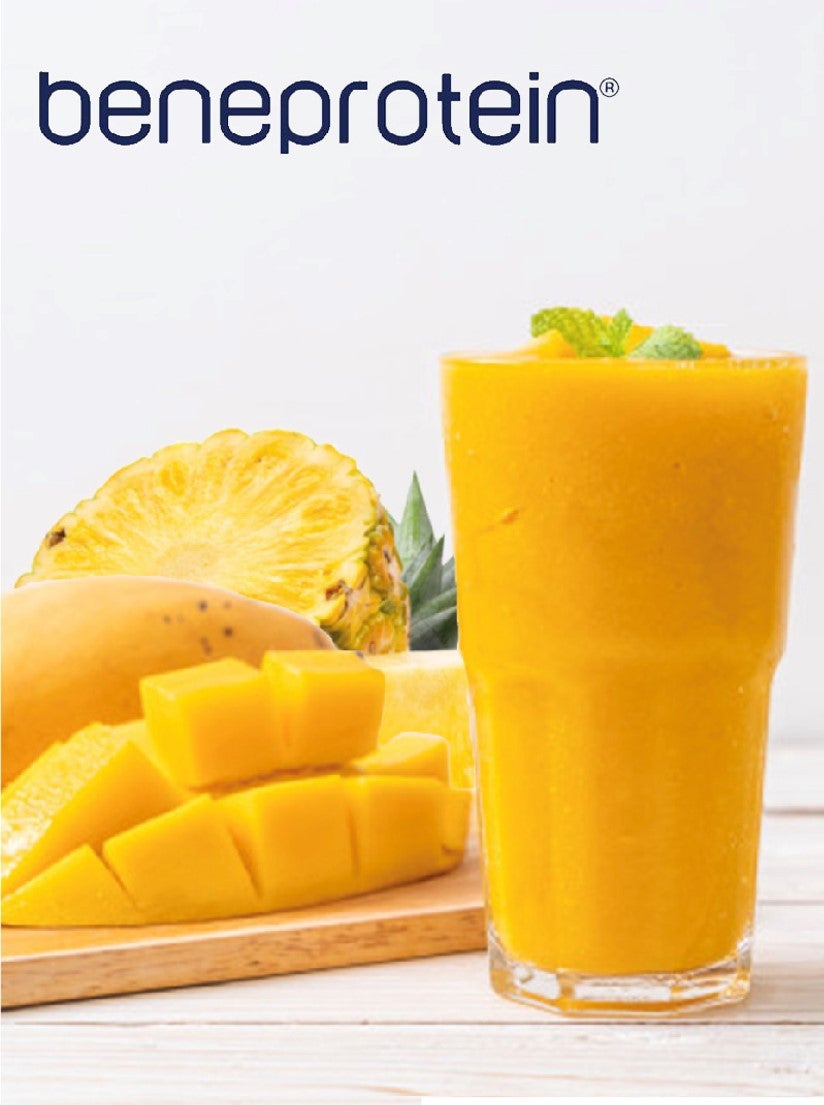
TROPICAL PROTEIN SMOOTHIE®
INGREDIENTS:
2 scoops of BENEPROTEIN® Instant Protein Powder
1/2 cup Pineapple
1/2 cup Mango
2 tbsp (30 mL) Chia seeds
1 cup (250 mL) Coconut milk
Preparation
Combine all ingredients and blend until smooth.
Serving size: 1
TIP: Try your smoothie in a bowl instead of a glass – topping with shredded unsweetened coconut, sliced bananas, hemp seeds and fresh berries.
NUTRITION INFORMATION,
Calories 700 | Fat 52 g | Saturated Fat 43 g | Cholesterol 0 mg | Sodium 110 mg | Carbohydrate 44 g | Fibre 11 g | Sugars 20 g | Protein 12 g
Recommended Usage: Take 1-2 servings per day as part of a varied and balanced diet and healthy lifestyle. Do not exceed the recommended daily use. For additional protein requirement, please consult your healthcare professional.
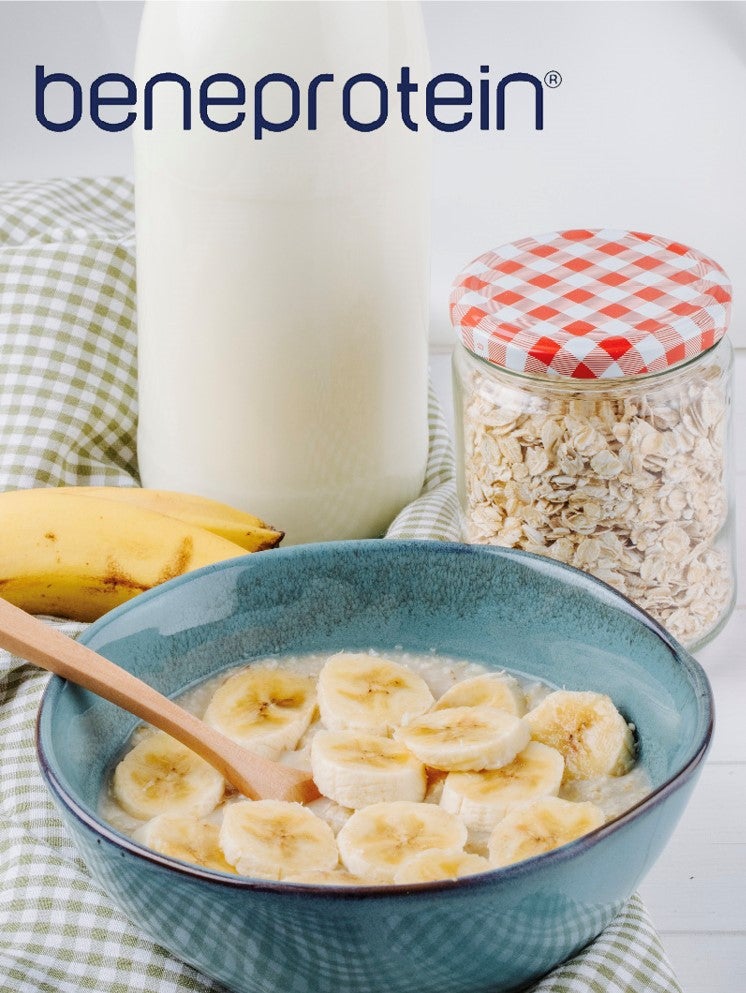
SUPERCHARGED OATMEAL
INGREDIENTS:
1 cup prepared hot oatmeal
2 scoops of BENEPROTEIN Instant Protein Powder
Preparation
Add BENEPROTEIN to oatmeal and mix with a spoon until protein powder is completely dissolved. Add your favorite accompaniment (raisins, nuts, brown sugar, cinnamon, etc.) and serve.
Serving size:
1 cup
NUTRITION INFORMATION,
Calories 220 | Total fat 4g | saturated fat 0g | Cholesterol 0mg | Potassium 230mg | Sodium 30g | Total carb 28g | Dietary Fiber 4g | Sugars 1g | Protein 12g | Phosphorus 220mg mg
Recommended Usage: Take 1-2 servings per day as part of a varied and balanced diet and healthy lifestyle. Do not exceed the recommended daily use. For additional protein requirement, please consult your healthcare professional.
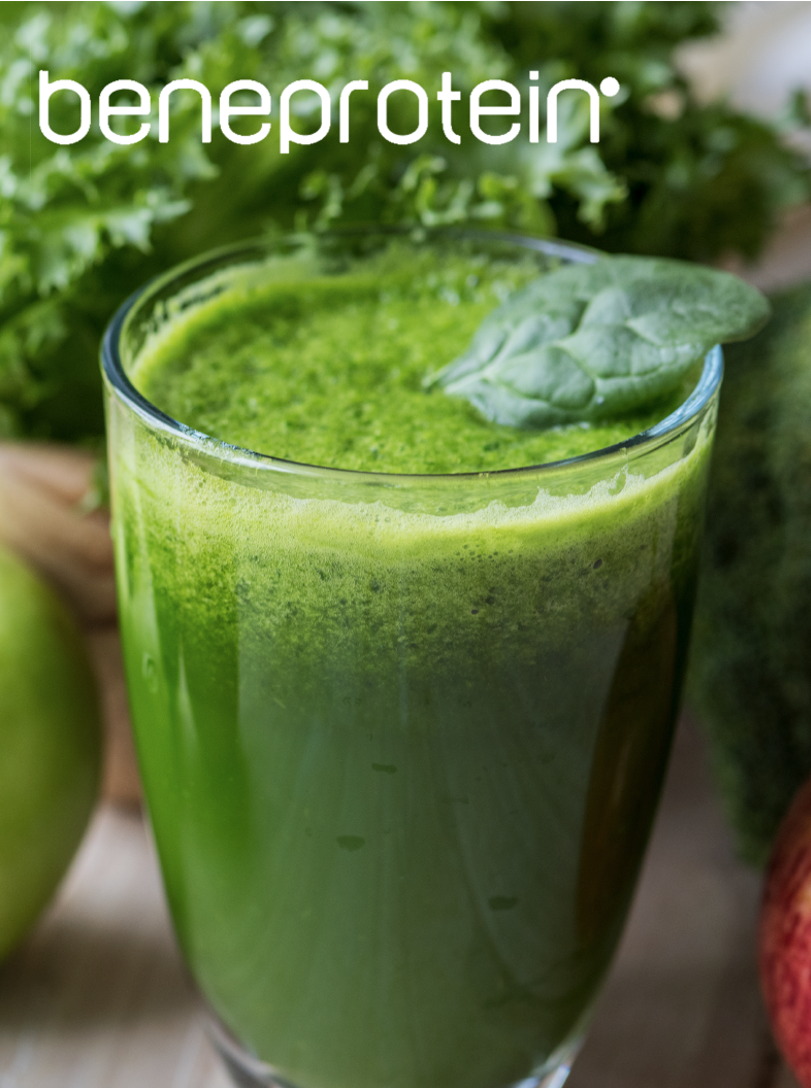
GREEN PROTEIN SMOOTHIE
INGREDIENTS:
2 scoops BENEPROTEIN Instant Protein Powder
1 1/3 cups (325 mL) Unsweetened almond milk
1 cup Chopped kale and spinach (stems and ribs removed)
1.2 Banana (frozen)
1/4 cup (60mL) Chopped mango
Preparation
Combine all ingredients and blend until smooth
Serving size:
Makes 1 serving
NUTRITION INFORMATION,
Calories 220 | Total fat 4g | saturated fat 0g | Cholesterol 0mg | Sodium 300g | Carbohydrate 27g | Fibre 4g | Sugars 13g | Protein 12g
Note: Try replacing mango with chopped pineapple for a slightly sweeter taste. Don’t be afraid to experiment with different greens.
Recommended Usage: Take 1-2 servings per day as part of a varied and balanced diet and healthy lifestyle. Do not exceed the recommended daily use. For additional protein requirement, please consult your healthcare professional.
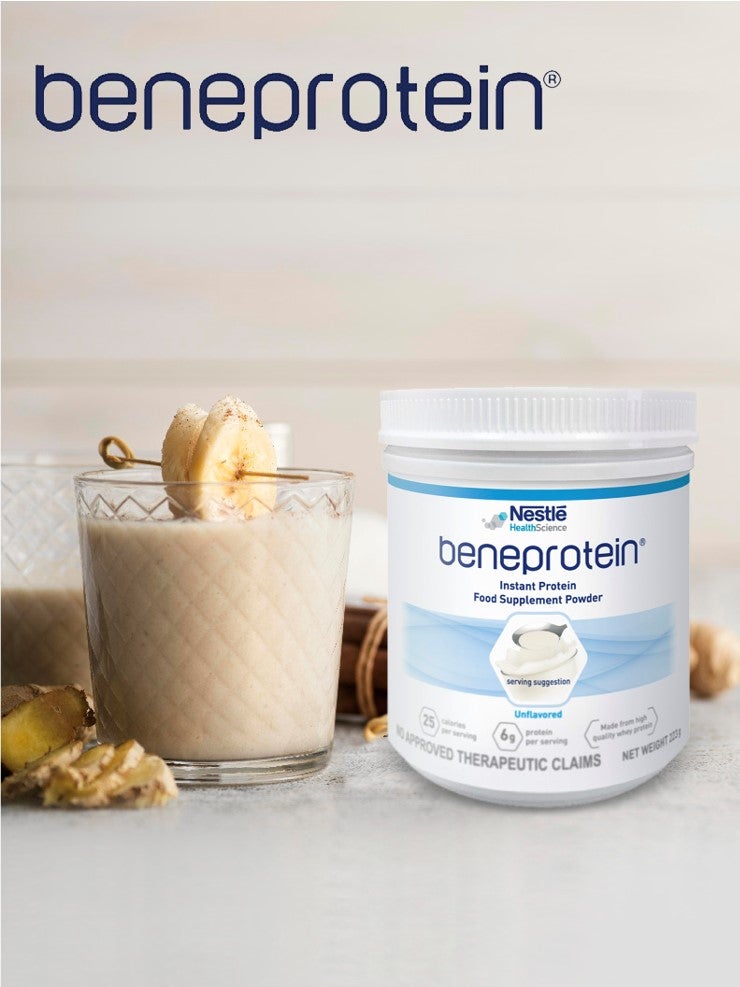
PEANUT BUTTER & BANANA PROTEIN SMOOTHIE
INGREDIENTS:
½ cup milk
2 scoops BENEPROTEIN Instant Protein Powder
2 tbsp peanut butter
1 small banana
Preparation
Place all ingredients in a blender ad mix until smooth. Serve immediately or cover and refrigerate. Consume within 24 hours
Serving size:
Makes 1 serving
approximately 8 fl oz
NUTRITION INFORMATION,
Calories 400 | Total fat 18g | saturated fat 4g | Cholesterol 10mg | Potassium 490mg | Sodium 240g | Total carb 40g | Dietary Fiber 5g | Sugars 23kg | Protein 12g | Phosphorus 300mg
Note: Smoothie may become thick over time when held in refrigerator. Thin with additional milk until desired consistency is achieved.
Recommended Usage: Take 1-2 servings per day as part of a varied and balanced diet and healthy lifestyle. Do not exceed the recommended daily use. For additional protein requirement, please consult your healthcare professional.
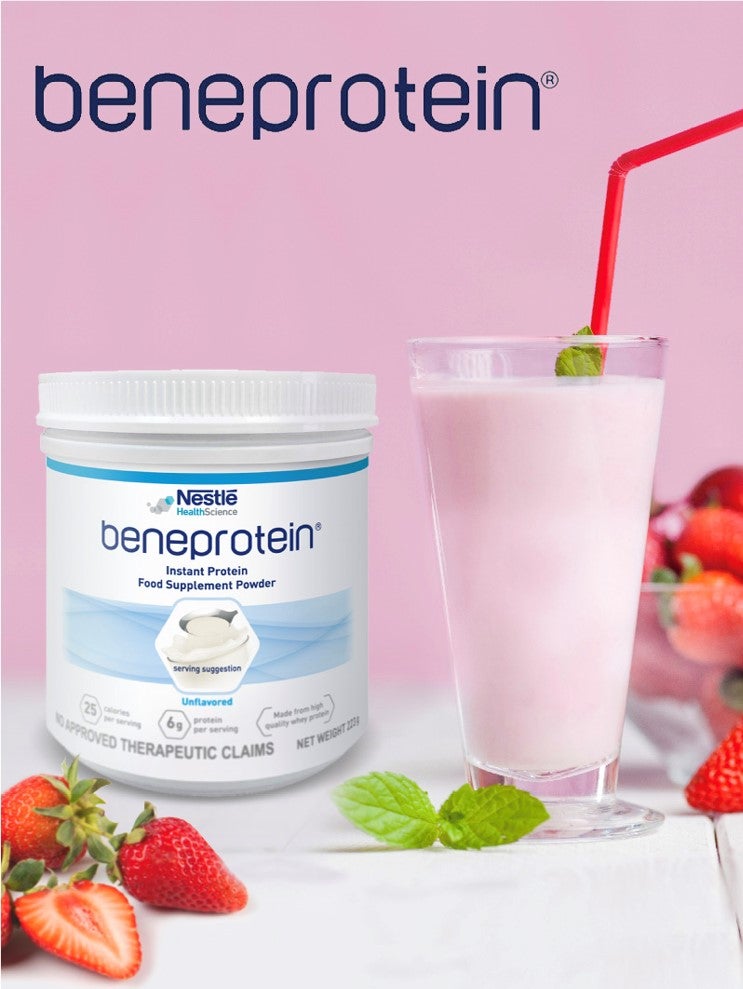
STRAWBERRY PROTEIN SMOOTHIE
INGREDIENTS:
½ cup low fat strawberry yogurt
1/4 cup milk
2 scoops BENEPROTEIN Instant Protein Powder
½ cup slices strawberries
Preparation
Place all ingredients in a blender ad mix until smooth. Serve immediately or cover and refrigerate. Consume within 24 hours
Serving size:
Makes 1 serving
approximately 8 fl oz
NUTRITION INFORMATION,
Calories 210 | Total fat 2g | saturated fat 1g | Cholesterol 10mg | Potassium 390mg | Sodium 31g | Total carb 120g | Dietary Fiber 2g | Sugars 24kg | Protein 12g | Phosphorus 220mg
Note: Smoothie may become thick over time when held in refrigerator. Thin with additional milk until desired consistency is achieved.
Recommended Usage: Take 1-2 servings per day as part of a varied and balanced diet and healthy lifestyle. Do not exceed the recommended daily use. For additional protein requirement, please consult your healthcare professional.
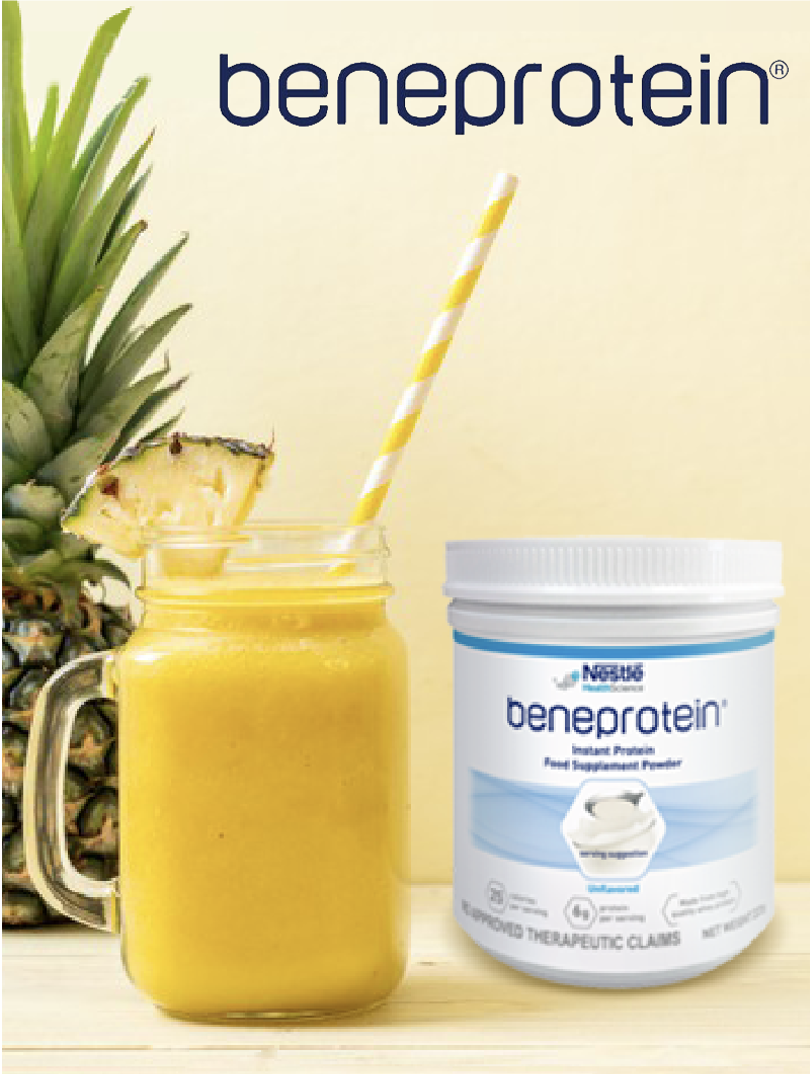
SPICED PINEAPPLE PROTEIN SMOOTHIE
INGREDIENTS:
2 scoops BENEPROTEIN Instant Protein Powder
½ cup (125mL) milk
1/3 cup (75mL) light coconut milk
½ frozen banana
¼ cup (60mL) frozen pineapple chunks
1 tsp (5mL) honey
½ tsp (2ml) finely grated fresh ginger
Pinch ground turmeric
Preparation
Blend milk, coconut milk, banana, pineapple, BENEPROTEIN, powder, honey, ginger and turmeric in blender until smooth.
Serving size:
Makes 1 serving
NUTRITION INFORMATION,
Calories 300 | Total fat 7g | Saturated fat 4.5g | Cholesterol 0mg | Sodium 125g | Carbohydrate 35g | Fibre 3g | Sugars 25g | Protein 12g
Note: Use remaining coconut milk to make curries or soup or freeze to make more smoothies. Honey can be adjusted for personal preference: reduce for fewer grams of sugar per serving or increase slightly for extra sweetness.
Recommended Usage: Take 1-2 servings per day as part of a varied and balanced diet and healthy lifestyle. Do not exceed the recommended daily use. For additional protein requirement, please consult your healthcare professional.





